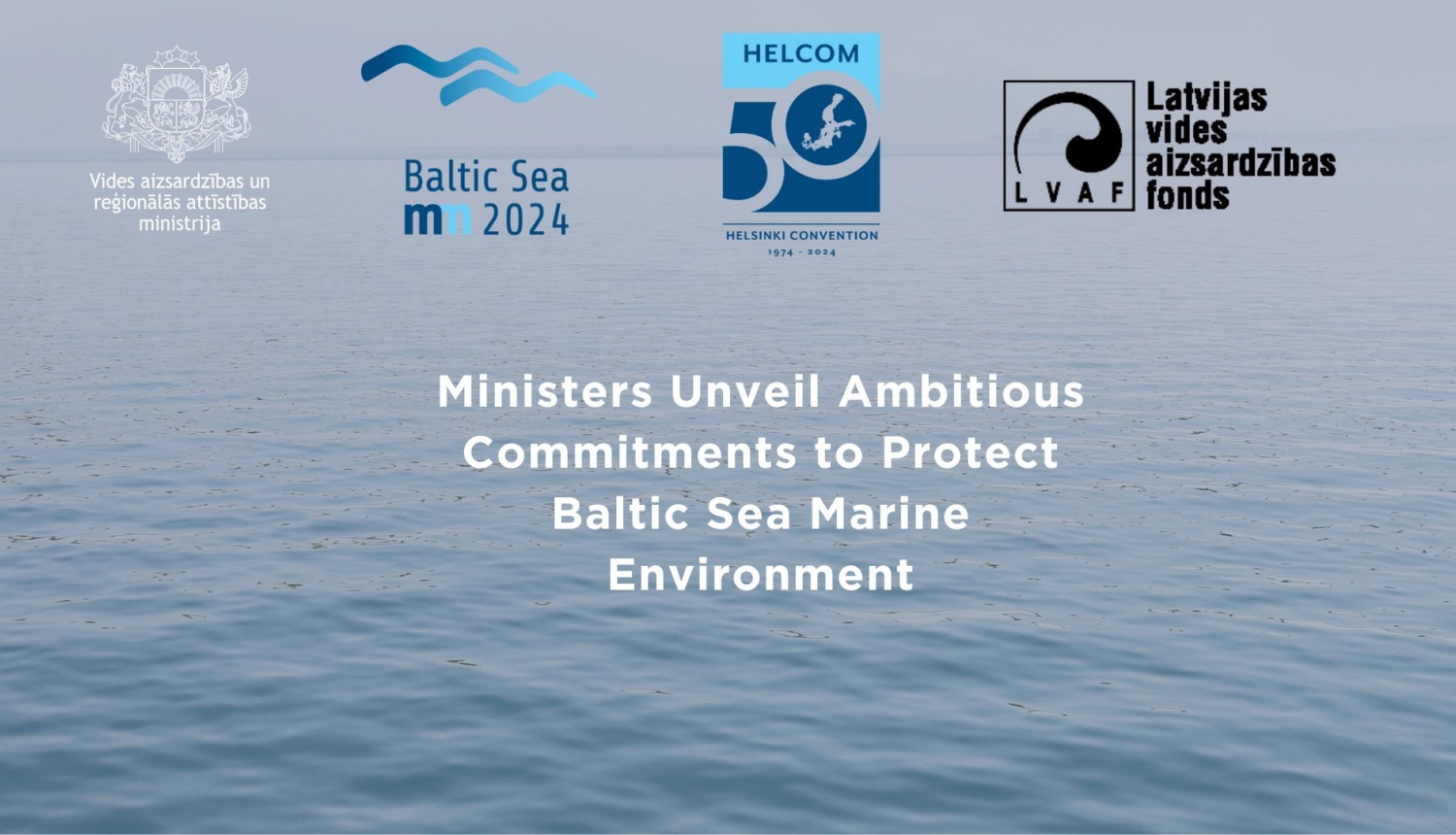The ministers and high-level representatives of the Baltic Sea coastal states and the EU gathered in Riga, Latvia, for the 2024 Ministerial Meeting on the Baltic Sea Marine Environment. They reaffirmed their strong commitment to continued joint efforts to reach a healthy Baltic marine environment. A Ministerial Declaration, as well as a statement on the geopolitical situation, are the outputs of the meeting, convened under the auspices of the current Latvian Chairmanship of HELCOM.
“Acknowledging the 50th anniversary of the 1974 Convention on the Protection of the Marine Environment of the Baltic Sea Area and the vital role of the Helsinki Commission (HELCOM), we have underscored our commitment to addressing the pressing environmental challenges facing the Baltic Sea. Despite the progress made since the adoption of the first Baltic Sea Action Plan in 2007, the current state of the marine environment remains unsatisfactory due to human activities. However, notwithstanding the highly challenging geopolitical situation, the work to protect our fragile common sea continues with even stronger vigor,” said Inga Bērziņa, Minister for Environmental Protection and Regional Development of the Republic of Latvia.
The Riga Ministerial Declaration recognizes the interconnectedness of environmental health and economic prosperity and the importance of stressing the economic benefits of preserving the Baltic Sea ecosystem. As shown by the latest Holistic Assessment of the Baltic Sea (HOLAS 3), achieving good environmental status by the year 2040 can yield economic benefits of 5.6 million euro per year for people around the Baltic Sea.
The ministerial debate focused on better targeting and prioritizing efforts to implement the 2021 Baltic Sea Action Plan, based on the new insights gained from HOLAS 3 and on continuing to successfully implement the HELCOM goals against the background of the challenging geopolitical situation in the Baltic Sea region.
“This high-level meeting took place at a crucial time, as we take stock of the achievements of HELCOM in its 50-year history while also determining how to integrate the findings from HOLAS 3 in shaping and defining HELCOM policies and priorities going forward,” says Rüdiger Strempel, Executive Secretary of HELCOM, adding: “It also sends a strong signal of continued cooperation of the EU and those HELCOM Contracting Parties that are also Member States of the EU in the framework of HELCOM and underscores the organization’s key role in addressing the triple planetary crisis of climate change, biodiversity loss and pollution in our region and beyond.”
The 2024 Ministerial Meeting on the Baltic Sea Marine Environment was attended by the ministers and high-level representatives of the Ministries of the Environment, respectively of Climate, of Infrastructure and of Maritime Affairs of eight Baltic Sea coastal states and the European Union.
Key documents:
Ministerial Declaration of the 2024 Ministerial Meeting on the Baltic Sea Marine Environment
HELCOM Statement on the geopolitical situation
About HELCOM
The Baltic Marine Environment Protection Commission, usually referred to as the Helsinki Commission or HELCOM, is an intergovernmental organization of the Baltic Sea coastal countries and the European Union. HELCOM has worked since 1974 to protect the marine environment of the Baltic Sea from all sources of pollution and to ensure safety of navigation in the region.
HELCOM is the governing body of the “Convention on the Protection of the Marine Environment of the Baltic Sea Area,” more usually known as the Helsinki Convention.
The Helsinki Commission’s member states are the contracting parties to the Helsinki Convention: Denmark, Estonia, the European Union, Finland, Germany, Latvia, Lithuania, Poland, Russia and Sweden. Due to the current geopolitical situation, the EU and the Contracting Parties to HELCOM that are also member states of the EU (H9) have, however imposed a “strategic pause” in HELCOM operations. This pause entails the postponement of the meetings of all official HELCOM bodies, with meetings being carried out as so-called informal consultation sessions involving H 9 participants only and Russian involvement restricted to correspondence procedures.
About Ministerial Meetings
Every three years, HELCOM arranges a Ministerial Meeting, gathering ministers responsible for environmental or maritime affairs from the Baltic Sea countries and the EU Commissioner for the Environment. These Meetings serve as crucial forums for engaging in shared discussions and reaching agreements at a high political level. They further reinforce HELCOM’s objectives in protecting the Baltic marine environment.
Ministerial meetings result in the adoption of political declarations, through which Contracting Parties commit to taking further actions to protect the marine environment of the Baltic Sea and agree on the future agenda for HELCOM. The declarations complement the Helsinki Convention and HELCOM Recommendations.
About HELCOM Holistic Assessments
HELCOM carries out holistic assessments every six years. They focus on how the Baltic Sea ecosystem is doing and, importantly, on following up on how well the agreements – namely, the measures set in the 2021 HELCOM Baltic Sea Action Plan (BSAP) – are functioning. The holistic assessments cover ‘moments’ in time over the dynamic life history of the Baltic Sea.
The third HELCOM holistic assessment (HOLAS 3) focuses on the years 2016-2021 and includes results at various levels of detail, including monitoring data, indicator reports and thematic assessments.
Contact
Johanna Laurila
Communications Advisor, HELCOM
johanna.laurila@helcom.fi
+358 40 647 3996
Communication division
Ministry of Environmental Protection and
Regional Development of the Republic of Latvia
+371 20 200 305
prese@varam.gov.lv
www.varam.gov.lv
